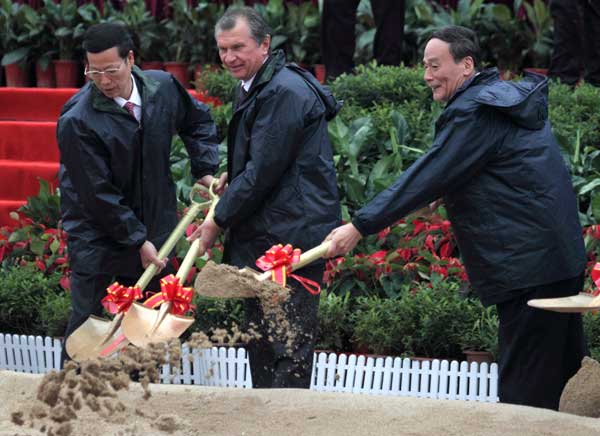Foreign and Military Affairs
Hat trick pulled off in Tianjin
By Cheng Guangjin (China Daily)
Updated: 2010-09-22 09:55
 |
Large Medium Small |
Cooperation agreements seal sixth round of negotiations
 |
|
Vice-Premier Wang Qishan (right), Russian Deputy Prime Minister Igor Sechin and Zhang Gaoli, Party chief of Tianjin municipality, lay the foundation for the China-Russia Eastern Petrochemical (Tianjin) Oil Refinery on Tuesday. Wang Jing / China Daily |
TIANJIN - Three cooperative agreements were signed after the sixth round of China-Russia energy negotiations on Tuesday in Tianjin, which will pave the way for the upcoming meeting of the two countries' presidents later this month.
The agreements include the construction of a 13-million-ton per year oil refinery project in the port city of Tianjin, to be jointly set up by the China National Petroleum Corporation and Rosneft Oil, the two countries' oil giants.
"This marks China and Russia having made a big stride in oil cooperation from importing and exporting to processing," said Chinese Vice-Premier Wang Qishan, who laid the foundation for the China-Russia Eastern Petrochemical (Tianjin) Oil Refinery together with his Russian counterpart, Igor Sechin.
"Investment in the project will total $5 billion," AFP quoted a Sechin aide as having said.
Russia will have a 49 percent stake in the project and China 51 percent, he said.
"This is just the construction of the plant," he said, adding that the two companies planned to build at least 500 petrol stations in China in the second phase of the project.
The other two agreements are on major enterprises in the two counties cooperating over coal energy.
Analysts said the agreements benefit both countries and can accelerate their cooperation over natural gas.
Last month, the Russian section of the China-Russia oil pipeline was completed.
"The oil refining project in Tianjin and the completion of the China-Russia oil pipeline are milestones in the history of China-Russia energy cooperation," Assistant Foreign Minister Cheng Guoping said on Monday ahead of the foundation laying ceremony for the oil refinery plant.
Russian President Dmitry Medvedev, who is due to make a three-day state visit to China from Sept 26, will attend a ceremony that will be held when the Chinese section of the oil pipeline has been completed.
According to contracts signed by the two countries, Russia is due to supply oil to China through the pipeline from Jan 1 next year.
Vice-Premier Wang said the sixth round of China-Russia energy negotiations was intended to pave the way for Medvedev's visit, which will be his fifth meeting with Chinese President Hu Jintao this year.
Sechin promised during Tuesday's talks that Russia will ensure a long-term and stable supply of oil to China through the pipeline. He also vowed to facilitate cooperation on natural gas, as well as to enlarge cooperation on coal energy, the power trade, nuclear and new energies.
Xia Yishan, a researcher at the China Institute of International Studies, said the agreements provide Russia with a stable oil buyer and a long-term energy market.
The Tianjin oil refinery project guarantees that China will have continuous oil imports and deepens the two countries' cooperation over oil processing and sales, an area in which Russia has been keen to expand its role from that of solely an exporter.
"The oil agreements also lay a foundation for the progress of their natural gas negotiations, which started simultaneously with the oil talks but lagged far behind," Xia said.
Yang Jing contributed to this story.











